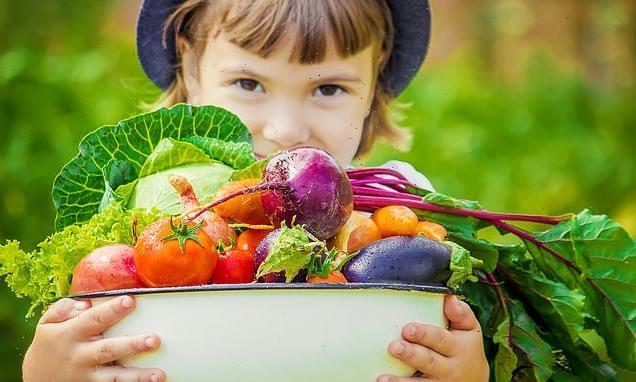
Children on trendy vegan diets are 1.2 inches SHORTER on average, with smaller and weaker bones, study warns
- The study involved 187 healthy five to ten-year-olds, including 52 vegans
- Vegan children averaged 1.2in shorter and had 4-6% lower bone mineral content
- They were also 3 times more likely to be deficient in vitamin B-12 than omnivores
Putting your children on a trendy vegan diet makes them grow up short and with weaker bones, a study has found.
Researchers found that children aged five to ten who eat plant-based diets are on average three centimetres shorter than those who eat meat.
Their bones were also smaller and less strong, putting the children at risk of fractures or osteoporosis in later life.
The study, by University College London’s Great Ormond Street Institute of Child Health, said parents must be aware of the risks of vegan diets.
The authors said vegan children should be given vitamin B12 and vitamin D supplements to reduce potentially long-term health consequences of being raised on plants only.
Scroll down for video
Putting your children on a trendy vegan diet makes them grow up short and with weaker bones, a study has found (stock image)
Healthy eating as a vegan
You can get most of the nutrients you need from eating a varied and balanced vegan diet.
For a healthy vegan diet:
1. Eat at least 5 portions of a variety of fruit and vegetables every day
2. Base meals on potatoes, bread, rice, pasta or other starchy carbohydrates (choose wholegrain where possible)
3. Have some dairy alternatives, such as soya drinks and yoghurts (choose lower-fat and lower-sugar options)
5. Eat some beans, pulses and other proteins
6. Choose unsaturated oils and spreads, and eat in small amounts
7. Drink plenty of fluids (the government recommends 6 to 8 cups or glasses a day)
If you choose to include foods and drinks that are high in fat, salt or sugar, have them less often and in small amounts.
Source: NHS
The number of vegans in Britain has quadrupled in four years to some 600,000, amid rising concerns over animal welfare and the environment.
Vegans cut out all animal products, including dairy, eggs and even honey. But there is little evidence on the potential damage this does to children’s health.
Lead author Professor Jonathan Wells, from UCL, said: ‘We know that people are increasingly being drawn to plant-based diets for several reasons, including promoting animal welfare and reducing our impact on the climate.
‘Indeed, a global shift towards plant-based diets is now recognised to be crucial for preventing climate breakdown, and we strongly support this effort.
‘We also know that until now research into the health impact of these diets on children has been largely limited to assessments of height and weight and conducted only in vegetarian children.
‘Our study provides a substantial insight into the health outcomes in children following vegetarian and vegan diets.’
The new study looked at 187 healthy five to ten-year-olds in Poland. Of these, 63 children were vegetarians, 52 vegans and 72 omnivores.
Children on vegan diets were on average three centimetres shorter. They also had four to six per cent lower bone mineral content and were more than three times more likely to be deficient in vitamin B-12 than omnivores.
Co-author, Professor Mary Fewtrell added: ‘Maximizing bone health in children is recommended with the aim of reducing future osteoporosis and fracture risk.
‘We found that vegan children had lower bone mass even after accounting for their smaller body and bone size. This means they may enter adolescence, a phase when bone-specific nutrient needs are higher, with a bone deficit already established.
‘If such deficits are caused by a diet that persists into adolescence, this might increase the risk of adverse bone outcomes later in life.’
However, on the positive side, the vegan children had 25 per cent lower levels of ‘bad’ LDL cholesterol and lower levels of body fat.
Children on vegan diets were on average three centimetres shorter. They also had four to six per cent lower bone mineral content and were more than three times more likely to be deficient in vitamin B-12 than omnivores (stock image)
Co-author Dr Małgorzata Desmond said: ‘We found the vegans had higher intakes of nutrients that indicated an ‘unprocessed’ type of plant -based diet, which is in turn linked to lower body fat and better cardiovascular risk profile.
‘On the other hand, their lower intakes of protein, calcium, and vitamins B12 and D may explain their less favourable bone mineral and serum vitamin concentrations.
‘We were initially surprised by the poor cardiovascular health profile of the vegetarian children, but their dietary data showed that they were eating a relatively processed type of plant-based diet, with less healthy levels of fibre and sugars compared to the vegans.
‘So, we are learning that just eating plant-based diets is no guarantee of health, we still need to select healthy foods.’
The researchers hope their findings will highlight the need for more advice to the public as to how they can eat healthily on plant-based diets.
‘This is particularly relevant for children, as they may have higher nutrient needs while they are growing,’ Professor Wells added.
‘We aim to conduct further research, to help maximise the health benefits of plant-based diets in children.’
ARE VEGAN DIETS SAFE FOR BABIES?
Around 3.5million people living in the UK are vegan – the equivalent of around seven per cent of the population, according to estimates.
And, as the diet has surged in popularity, more mothers are choosing to make their baby a vegan.
The NHS says babies and young children on a vegetarian or vegan diet can get the energy and most of the nutrients they need to grow and develop.
However, the plant-based diet is known to be low in key nutrients for babies, such as vitamin B12 – found milk and eggs, iron, calcium and zinc.
A vitamin B12 deficiency is a rare and treatable cause of failure to thrive and delayed development in infants, researchers wrote in the journal Pediatrics.
It can also lead to malnutrition and ‘irreversible damage’ to their nervous systems, experts at University College London once concluded.
An iron deficiency can hinder a child from gaining weight, affect their appetite and energy and can lead to anaemia, which can be life-threatening in severe cases.
Consuming too little protein can lead to stunted growth, nutritionists have warned over the years. But beans, lentils and chickpeas are high in the nutrient.
And eating too much fibre can cause children to feel full quicker and stop them from getting enough food, paediatric dietitian Lucy Upton told the Mail in March.
Two senior lecturers in nutrition at Cardiff Metropolitan University, Shirley Hinde and Ruth Fairchild, said the diet was ‘less than ideal’ for babies.
However, writing in The Conversation they added it is ‘not out of the question’ that the diet could be healthy for a baby.
And they claimed there is ‘no reason’ why a baby couldn’t survive on a vegan diet that was varied in many nutrients, if their parents were sensible.
Source: Read Full Article

